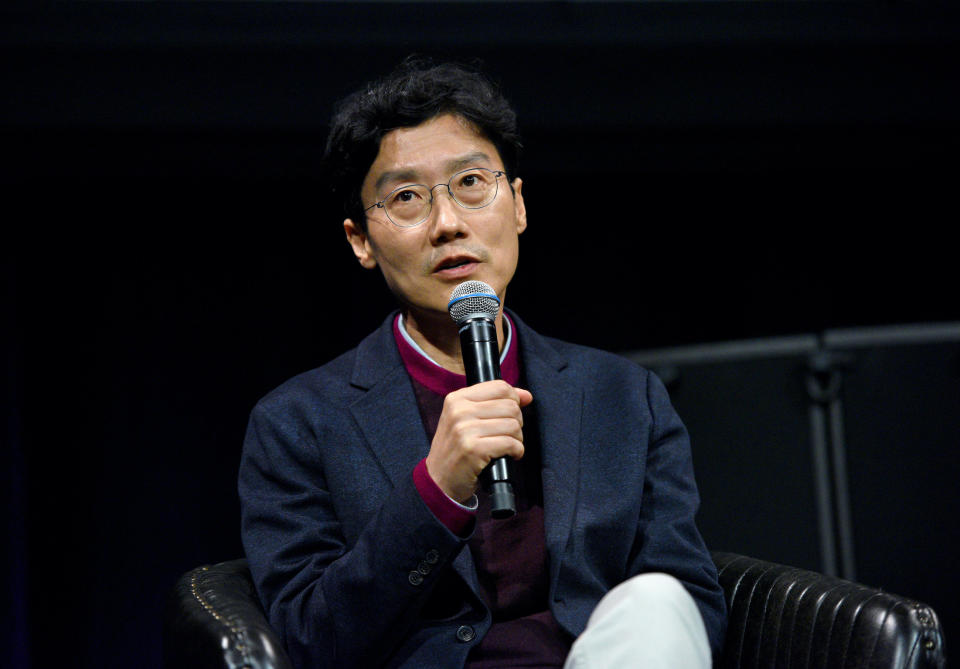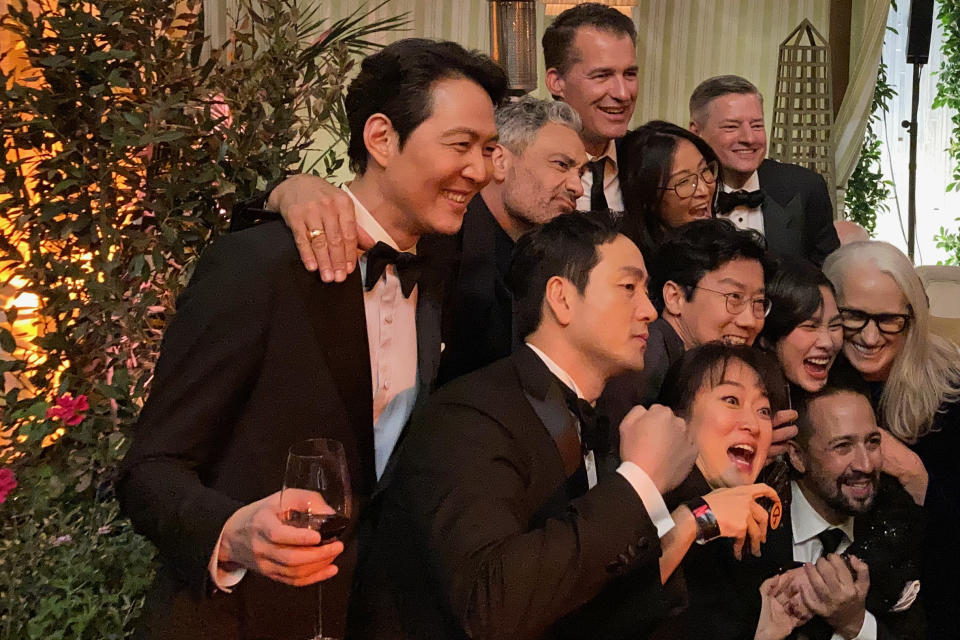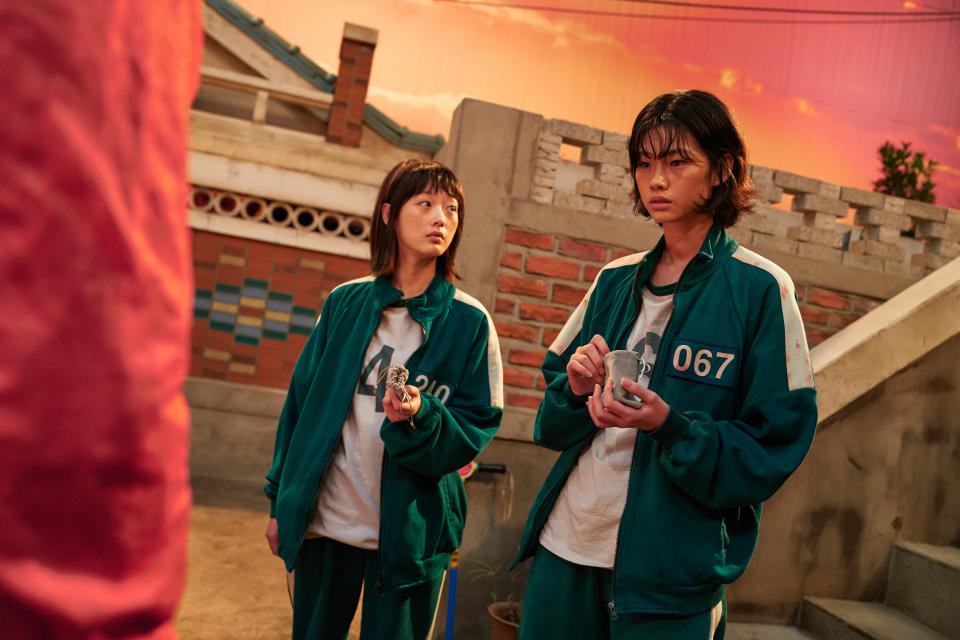‘Squid Game’ Creator Planted S2 Clues ‘Just in Case’ There Was Another Season

- Oops!Something went wrong.Please try again later.
- Oops!Something went wrong.Please try again later.
Welcome to It’s a Hit! In this series, IndieWire speaks to creators and showrunners behind a few of our favorite television programs about the moment they realized their show was breaking big.
Korean auteur Hwang Dong-hyuk had written and directed four local features when he intuited that Netflix might be interested in expanding his “Squid Game” screenplay, which had been collecting dust for over a decade, into a series. After a torturously long writing process, and an eight-month shoot that was so stressful that the first-time showrunner and director lost six teeth, Hwang anticipated that his first foray into episodic television might hit big in Korea.
More from IndieWire
'Hustle' Review: Adam Sandler and LeBron James Team Up for Netflix's Rock-Solid Basketball Drama
'Only Murders in the Building': It Took Just One Fateful Elevator Ride for Hulu Comedy to Click
But he didn’t expect “Squid Game” to be a global hit. And it didn’t hit him how beloved the series was until he flew to Los Angeles for the February 27 SAG Awards, the first big live awards show after the pandemic. “Squid Game” was nominated in four categories and won three, including Best Stunt Ensemble and Best Male Actor and Female Actor in a Drama Series for Lee Jung-jae and Jung Ho-yeon, respectively. “I almost felt like we were at the center of attention,” said Hwang, “because so many people were coming up to our table wanting to say ‘hi’ and take photos. We had only heard of the show being very popular in the United States, but to really see and meet with the Hollywood directors and actors who were telling me that they enjoyed the show so much — it was such a great feeling.”
Among the many people who approached Hwang with praise during award season: Leonardo DiCaprio, Will Smith, Steven Spielberg, and Guillermo del Toro. So many people asked how they could see his other films that Hwang requested that Netflix make them available beyond Korea. “Netflix said ‘yes’ right away,” he said, “and they bought them and serviced them in the States.”
Of course the next question is what is happening with Season 2. Hwang had no plans to write a second season while writing the first series. But he planted hints and clues throughout the story in Season 1, he said, “for myself and also the audience. Just in case there is another season, these things could be loose knots. I only currently have a broad storyline. I’m in the process of structuring the story and the new games, and wanting to crystallize them into more detailed ideas.”
Hwang came up with the nugget of “Squid Game” back in the 2008 recession, when he was in deep debt, and reading Japanese mangas like “Gambling Apocalypse: Kaiji,” “Liar Game” and “Battle Royale.” He thought: “What if I were given the chance? Would I be up for it? Would I go enter these games? There is a huge cash prize and I’m so in need of money, but I’m too scared to to participate. And the games are so hard. What kind of games would I be willing to participate in for the money? What if they were more easy? Maybe like a child’s game? Yeah, I’d be up for it.”
As he conjured the story, Hwang drew from his own life and his family and friends’ experiences, as well as the long labor strife at Sanyo Motors. “I’m aware of what happened after the Sanyo Motors strikes,” said Hwang. “A number of laborers committed suicide; a lot of them are still struggling to this day.”

Getty Images for Netflix
But Hwang couldn’t get arrested. “People were telling me, ‘This is really original, how did you come up with something so strange?'” he said. “That was probably the best comment that I got. Because most people thought it was too unrealistic and too violent, that it was just way too far from reality. And at the time, Korean cinema circles were afraid because they were so unfamiliar with the fantasy or the surreal genre. And on top of that, the screenplay seemed like it was going to cost a lot of money. And it was going to be R-rated because of the violent elements. So people thought that it was not commercially very valuable. They didn’t believe in me.”
At the time, Hwang’s first feature had not been commercially successful, but his next three hit big in a range of genres. “At the time, I didn’t want to revisit it and make it into a feature film,” he said. “Even during the writing process, I felt that this was a story that may not be the easiest to create as a feature. So I got to thinking maybe something like a cartoon or a webtoon series would be a better fit. And by doing so I can tap the public’s response and get a sense of how they would react to it.”
In 2018, when Hwang pitched “Squid Game” as a webtoon, he read the script again and changed his mind. “And to my surprise, it wasn’t as strange or as unrealistic as way back when I had first written it,” he said. “I felt: ‘This is a story that could be told in these times.’ Was the reason it didn’t feel as unrealistic because the times had changed, or I had changed?” But he decided it wasn’t a good fit for a feature film.
That’s when Hwang thought of Netflix, which had just begun business in Korea and to invest in Korean content. “This could be the right subject material for that,” he said. “The reason I wanted to do a webtoon series in the first place was to have that as a stepping stone to create it into a live action series. ‘Maybe we can just skip that process and go straight to Netflix.’ So I pitched them the story.”

Anne Thompson
Netflix loved it. Now Hwang had to write his first series. He planned to write eight episodes, with an intro and an ending and six devoted to each game. With a feature film, he said, “I’d have to stick to the same tone and manner throughout the two hours. But given eight hours, it gave me a lot of freedom to dance around in between different genres. So I would go from comedy to action to human drama, and a lot of that was fun, because of the amount of freedom I was given.”
But he felt like he’d never lick it. “The whole process was so much longer, with so much more writing to do, that it was just physically and mentally unlike anything I had done before,” said Hwang. “There were, I have to admit, some moments where I came to a writer’s block, I felt like it was a dead end, and I thought about quitting. But at the same time, this shift in format gave me the room to explore and add more characters, richer backstories, and different relationships and character dynamics. And it also gave me the time to create and imagine different stories in between these games. And I had a lot of fun thinking about how to leave the audience hanging, wanting more, how to make them binge-watch the next series. So what kind of cliffhangers I’m going to leave them with, after each episode? It was a level of pain and joy that I had not expected, ever.”
During editing, when episode eight became too long, Hwang divided the last episode into two, for a total of nine episodes. Hwang was not prepared for the sheer toll of the production, which took about six months to prepare and eight months to shoot, with one month for lockdown. And then he faced a long post-production period. “It was honestly not easy to do,” he said. During filming he ignored his chronic gum inflammation, which meant extracting six teeth after the show wrapped. “But there was a huge sense of achievement through it all, to really see in front of your eyes, what only existed in my mind and in my imagination, and then to see all of these different scenes connect and create a longer story. It gave me a new sense of achievement that wasn’t there when I was working on films.”

Netflix
Central to the show’s success was Korean movie star Lee Jung-jai, who broke out as a star when Hwang was a young man. “He and I are about the same age,” he said. “I have followed his creative works as a fan throughout all of those years. And when I was imagining the ‘Squid Game’ stories and writing the details, I had thought that it would be a great fit to have an actor who has gone through all of these different years, just as I had in the real world, to play the main character, that would be a great fit. And in the beginning of Jung-jae’s career, he played wild and cool male leads. And then he had a period where he played comedic roles. And then towards the later years of his career, he portrayed charismatic villains.”
Lee’s character Seong Gi-hun starts out as a far from sympathetic schlep who bets his grandmother’s money at the race track, and loses. Lee exemplifies the everyman, in Korea or elsewhere, who is trapped, who cannot escape, who has no recourse but to be reduced to behaving badly. Over the course of the life-and-death, high stakes Squid Games, he rises to the occasion, under duress, and reveals values that we never would have expected him to have. “Squid Game” is a strong indictment of Korean culture and unfortunately, the entire world, including the United States. This is why the series has resonated far and wide. It is easy to identify with these themes and feel pity and compassion for Hwang’s characters.
“Gi-hun is a pathetic, and almost clumsy guy,” said Hwang. “And then he goes through these different events throughout the story where he becomes a completely different man towards the end. And he comes out as the winner that has gone through all of these struggles. The character arc was in line with Jung-jae’s career as an actor as well.”

Netflix
Lee agreed to play the role, even though he was anxious about being able to pull the audience along with him when he was behaving like an asshole. “That was a big challenge,” said Hwang. “I had many conversations about this with Jung-jae. Because when you see this character, he’s so broken, and so childish. He’s not able to get his daughter a [birthday] gift, getting her this ridiculous, fake gun that’s a lighter. Is it going to be possible for the audience to root for someone like him as the main character? If it had been a two-hour feature film, it would not have been easy to do that with the character. But because of the longer hours I was given the opportunity to give a glimpse of what he really is like, how he ended up being this way, his past, his hurts, and what really goes inside his mind.”
Hwang added a scene to make Gi-hun more sympathetic. After he gets money from a man on the subway, he buys fish and on his way home meets a stray cat and gives it a piece. “Even though this man you see is so broken, so flawed, and is a ‘loser,'” said Hwang, “at his heart there’s still goodness there. And I wanted people to wonder what happened to this man. I wanted that scene to play like a clue to who this man really was.”
Needless to say, Hwang is aware that Netflix wound up making a lot more money on Season One than he did, an estimated $900 million for a show that cost $21.4 million to produce, around $2.4 million an episode. While he plans to go ahead with Season 2, he has not finalized the deal. Now is his chance for a big payday, but he may want to hire an agent to help him maneuver through his next moves. “They’re paying better,” he said. “I still haven’t signed anything official yet. But we are all on the same page, that a second season is needed, and is coming.”
Few of the Season 1 characters survive: they include Gi-hun, who at the end of the series is hoping to bring down the games, and the villainous game front man. For now Hwang has done the meetings rounds (“I met almost everybody in Hollywood”) and is working with an entertainment attorney, Kevin Yorn. “We’ve been talking back and forth,” he said. “I’m going to sign with agents soon because I need some plan to navigate through Hollywood for my next projects. CAA, WME or UTA? I haven’t decided yet.”
Best of IndieWire
Emmy Predictions: Outstanding Documentary or Nonfiction Special
Emmy Predictions: Outstanding Documentary or Nonfiction Series
Sign up for Indiewire's Newsletter. For the latest news, follow us on Facebook, Twitter, and Instagram.


